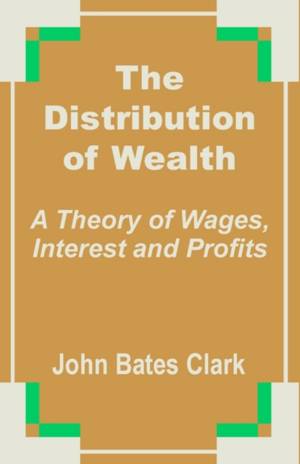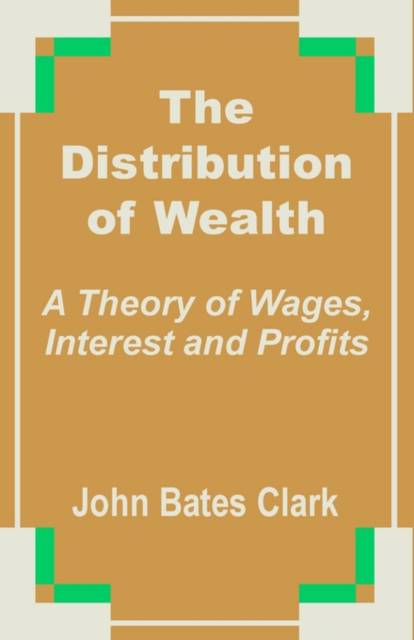
Door een staking bij bpost kan je online bestelling op dit moment iets langer onderweg zijn dan voorzien. Dringend iets nodig? Onze winkels ontvangen jou met open armen!
- Afhalen na 1 uur in een winkel met voorraad
- Gratis thuislevering in België vanaf € 30
- Ruim aanbod met 7 miljoen producten
Door een staking bij bpost kan je online bestelling op dit moment iets langer onderweg zijn dan voorzien. Dringend iets nodig? Onze winkels ontvangen jou met open armen!
- Afhalen na 1 uur in een winkel met voorraad
- Gratis thuislevering in België vanaf € 30
- Ruim aanbod met 7 miljoen producten
Zoeken
The Distribution of Wealth
A Theory of Wages, Interest and Profits
John Bates Clark
Paperback | Engels
€ 33,95
+ 67 punten
Uitvoering
Omschrijving
John Bates Clark (1847-1938) made important contributions to the economic debate of his time. In The Distribution of Wealth: A Theory of Wages, Interest and Profits, he developed the "marginal productivity" concept and the "product exhaustion" thesis behind the Marginal Productivity Theory of Distribution, which he was the first to develop in 1889, from which he then extrapolated enormous ethical conclusions. Clark believed that this theory was not only a correct theory of market incomes but demonstrated that market outcomes were just. In this book Professor Clark made the theory of marginal productivity clear enough that we take it for granted today. His work remains illuminating because of its classic explanations of the mobility of capital via its recreation while it wears out, the difference between static and dynamic models, the equivalence of rent and interest, the inability of entrepreneurs to "exploit" (meaning, underpay) labor (or capital) in a competitive market economy, the flaws of widely-quoted existing theories such as the labor theory of value and the irrelevance of rent on land, and, in a famous footnote, why von Thünen's concept of final productivity didn't go far enough. The author was Professor of Political Economy at Columbia University. He was a prominent apologist for the capitalist system whose insights influenced many other economists, including Frank Knight. He helped found the American Economic Association, serving as its president from 1893 to 1895.
Specificaties
Betrokkenen
- Auteur(s):
- Uitgeverij:
Inhoud
- Aantal bladzijden:
- 476
- Taal:
- Engels
Eigenschappen
- Productcode (EAN):
- 9781410201553
- Verschijningsdatum:
- 15/08/2002
- Uitvoering:
- Paperback
- Formaat:
- Trade paperback (VS)
- Afmetingen:
- 140 mm x 216 mm
- Gewicht:
- 598 g

Alleen bij Standaard Boekhandel
+ 67 punten op je klantenkaart van Standaard Boekhandel
Beoordelingen
We publiceren alleen reviews die voldoen aan de voorwaarden voor reviews. Bekijk onze voorwaarden voor reviews.











